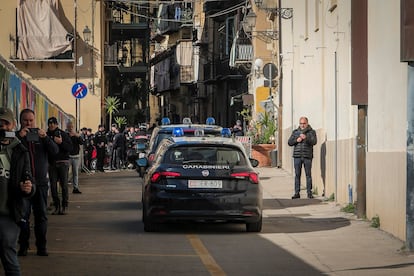Major raid reveals the secrets of the new Cosa Nostra: Video chats between bosses and ‘The Godfather’ as a school of life
The Carabinieri arrested 183 mafiosi from the most powerful clans in Palermo in a raid the likes of which has not been seen since the era of Judge Falcone in the 1980s

The Sicilian mafia entered a phase of invisibility after being defeated in the 1990s, with hundreds of arrests, and after the fall of the Corleonesi clan, which had engaged in a real war with the Italian state. Since then it is not what it once was, but it is still there. From time to time it receives blows from the authorities, but it always starts anew: an operation by the Palermo Prosecutor’s Office and the Carabinieri has revealed that Cosa Nostra had reorganized again.
It has been more than 40 years since the major raid led by Judge Giovanni Falcone in 1984, in which 366 mafiosi were arrested, leading to the macro-trial against the mafia. Cosa Nostra has not suffered a blow of such magnitude since then, until Tuesday: over 1,200 agents arrested 183 people, accused of belonging to several of the most important mafia families in Palermo, such as Porta Nuova, Tommaso Natale-San Lorenzo, Bagheria, Terrasini, Pagliarelli, and Santa Maria di Gesù.
The most interesting aspect is the wealth of information that has come to light as a result, through numerous wiretaps, which provide an idea of what the new Cosa Nostra is like. It is a combination of the traditional and the most modern: the bosses hold summits via video chat, protected by encryption programs, even from prison using tiny cellphones, one of the most alarming discoveries of the investigation. In fact, 33 of the arrest warrants were issued for mobsters who were already behind bars. The Porta Nuova boss, Calogero LoPresti, ordered someone to be punished from his cell via his encrypted cellphone, and then witnessed the beating live, via video call. The clans also buy weapons on the dark web and are involved in the internet gambling business.
Chance was decisive in the investigation, as the Carabinieri discovered the secret chat through bugs placed in the house and cars of a boss, Nunzio Serio, the capo of the Tommaso Natale area. It turned out that the chat he had been using until then was not working and he had to start a new one. To do this, he dictated to one of his men the people included in the original chat, so that he could add them to the new one; as such, the agents found out who formed the group. At that time, the clan was organizing a drug shipment from Calabria. Drug trafficking remains the main sphere of mafia business, and in this field it maintains collaborative relations with the ‘Ndrangheta, the Calabrian mafia, which years ago supplanted Cosa Nostra as the most important and dangerous criminal organization in Italy.
The rest of the Cosa Nostra’s operation is the same as it has always been, and it has held up surprisingly well: clans organized into mandamenti by areas of the city, solid hierarchies, rules of honor, bosses who continue to give orders from prison, lessons to young people who are starting out, topos (moles) in the courts, extortion... The clans continue to demand the pizzo, the mafia tax from the merchants in their area, and very few people report it. The imposition of fresh fish distributors in restaurants in Sferracavallo, a neighborhood by the sea, and Mondello, the famous beach in Palermo, has also been detected.
Because of this attachment to tradition, in some intercepted conversations nostalgia for the good old days can be discerned. Brancaccio boss Giancarlo Romano complains to one of his young members: “The level today is low, they arrest one and he turns pentito (a collaborator with justice), they arrest another, a miserable level…” He advises his protege to study in order to meet important people and make contacts (“you will meet doctors, lawyers, those who have ruled in Italy and in Europe”), and it is surprising — although perhaps not so much — to see how the stereotype is as strong as reality, because he cites The Godfather as a school of life: “If you watch The Godfather, you see the relationships he had. He was not the absolute boss, he is very influential because of the power he has built up at a political level in important circles.” Then follows a vent of frustration, because the current clans have lost contacts and relevance, but they never lose hope of taking over the city of Palermo again.
The particular values of the uomini d’onore (men of respect) appear in more than one conversation, such as this astonishing line from Gioacchino Badagliacca: “I have never believed in a Cosa Nostra for profit, I have always thought that it is for noble principles, for me this is Cosa Nostra. I have always believed it from the bottom of my heart, and I have spent 10 years in prison.”
What is striking, according to information provided by the Italian Prosecutor’s Office, is the clans’ ability to resist adversity and the mafiosi’s loyalty to their way of life. Even after leaving prison, after long sentences, they return to what they have always known. In fact, in recent years, heavyweights of Cosa Nostra have been released and their return to the streets was viewed with concern by investigators. Now it has been confirmed that they had good reason to be worried.
After the fall of the Corleonesi, the so-called Provincial Commission, a kind of board of directors of the big clans, was finally dissolved. But in 2018, a police operation foiled a new attempt to restore it. The scheme that is now emerging is that of the traditional division of territories by each family, but with collaboration between clans in business and a higher authority role for the families of Palermo over those of the rest of the province. And within Palermo, investigators have found that the boss of Porta Nuova, Calogero LoPresti, holds a prominent role, and is said to have the power to give orders even outside his territory.
Rituals and rigid rules
Thus the importance of rituals and what could be called mafia bureaucracy emerges once again. For example, there is the case of a mafioso who claims to have suffered an affront from an individual from Syracuse, and before punishing him he asks permission from the local family boss, who nevertheless replies that he has to follow the hierarchy, making the request first in Palermo.
It may seem surprising, but a rigid system of rules is a guarantee against the divisions and devastating wars of the past, which caused hundreds of deaths in the 1980s. In several conversations, the bosses speak of their awareness that unity is essential. And for that, problems must be resolved without shooting, in order to always maintain a low profile.
In keeping with tradition, one important factor is training young mafiosi, a continuing source of concern for veterans. The number of candidates does not seem to be a problem, as research indicates that Cosa Nostra still has an alarming magnetism among young people who want to make a career in crime. The issue is rather training them properly and educating them to respect the rules. A significant case has been reconstructed in the Pagliarelli mandamento, where a young man was given real mafia lessons by an experienced mafioso who is said to have been in charge of teaching him the trade, such as how to demand and collect the pizzo and how to behave in meetings with other mafiosi.
"Cosa Nostra continues to exert its charm in certain environments, such as in the suburbs, where young people have few alternatives for life and identify with the image of power that the mafia still conveys," explained the Palermo prosecutor, Maurizio de Lucia, in a press conference.
Sign up for our weekly newsletter to get more English-language news coverage from EL PAÍS USA Edition
Tu suscripción se está usando en otro dispositivo
¿Quieres añadir otro usuario a tu suscripción?
Si continúas leyendo en este dispositivo, no se podrá leer en el otro.
FlechaTu suscripción se está usando en otro dispositivo y solo puedes acceder a EL PAÍS desde un dispositivo a la vez.
Si quieres compartir tu cuenta, cambia tu suscripción a la modalidad Premium, así podrás añadir otro usuario. Cada uno accederá con su propia cuenta de email, lo que os permitirá personalizar vuestra experiencia en EL PAÍS.
¿Tienes una suscripción de empresa? Accede aquí para contratar más cuentas.
En el caso de no saber quién está usando tu cuenta, te recomendamos cambiar tu contraseña aquí.
Si decides continuar compartiendo tu cuenta, este mensaje se mostrará en tu dispositivo y en el de la otra persona que está usando tu cuenta de forma indefinida, afectando a tu experiencia de lectura. Puedes consultar aquí los términos y condiciones de la suscripción digital.









































